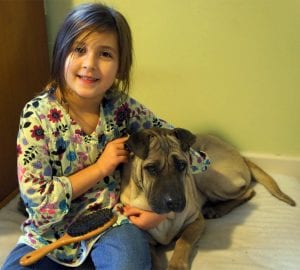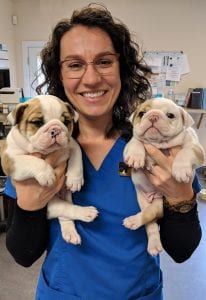Dr. Alicia Andras is a veterinarian at Maplewood Animal Hospital, owns Bellingham Holistic Veterinary Care, is a certified veterinary acupuncturist, and is certified in animal chiropractic by the IVCA.

WhatcomTalk: Thanks for talking to us Dr. Andras!
Dr. Andras: I think this is a great topic to get out there. We of course are learning day by day as things go, but this information is as up to date as I have. Knowledge is power against fear and panic.
WhatcomTalk: What should local pet owners know about getting pet care right now?

Dr. Andras: We here at Maplewood are running like most clinics in town. Still seeing urgent and illness appointments, as well as continuing puppy and kitten vaccines to ensure they are protected as they enter the world. We’re also still doing surgeries, including spays and neuters, as we feel it is important to prevent unwanted pregnancies and help control the pet population.
WhatcomTalk: You’re seeing furry clients, but are you having their humans in the building?
Dr. Andras: As for our safety protocols, we’re only doing curb-side drop-off, and not allowing any clients into the building. We feel this limits exposure as much as possible between our staff and clients.
If a (human) client is showing any signs of illness, we are urging them to NOT bring their pet personally, and instead find a friend or relative who can. But only if deemed absolutely necessary.
WhatcomTalk: What does an urgent or illness curbside drop-off appointment look like?
Dr. Andras: The owners call when they arrive and park in a numbered parking spot, check-in is done over the phone, a staff member takes one of our own washable leashes outside to collect the pet, brings it inside for its exam or treatments, and then the doctor calls with findings and recommendations.

Finally, the receptionist calls the owner to complete payment over the phone, and the pet is brought back out to the owner’s car. It’s been an adjustment, but we feel we’re still able to provide good care and communication, even though it can’t be face-to-face. The vast majority of our clients have been understanding.
WhatcomTalk: What about non-urgent and illness appointments?
Dr. Andras: Routine wellness appointments for check-ups, vaccines, or routine bloodwork have all been postponed for 4-6 weeks.
WhatcomTalk: Anything folks should know about prescriptions?
Dr. Andras: We [at Maplewood Animal Hospital] are encouraging people to get their pet medications filled for the next 4-8 weeks just in case of a total closure, and are working hard to keep up with them as they flood in. Similarly, everyone should have enough pet food at home to last two weeks or so, and if they’re on prescription diets, we need time to fill or order those.
WhatcomTalk: Should I be worried my dog will get sick, or get me sick?
Dr. Andras: There’s still no evidence that cats or dogs can become infected with COVID-19—other than the two dogs in Hong Kong, which needs more information to discern its importance. Their biggest role may be as fomites between human owners.

We know pets can transmit many other things to their owners, and that COVID-19 can live in the environment for a while, so it is logical to think viral particles could live on a pet for a time, as well. We know everyone loves to snuggle and kiss their pets, but we are urging caution during this time, as those kisses could carry a heavy price tag. Don’t allow them to lick you, avoid the urge to kiss their cute little heads, and wash your hands after contact—especially before touching your own face.
WhatcomTalk: I’ve been wondering about that. So, what are the new sidewalk rules?
Dr. Andras: If out walking with your pets, obey the social distancing for them as well, and do not allow other people to pet or touch them. Similarly, allowing dogs from different owners to play together may be risking transmission of particles on their fur or mouths that can then be transferred back to the owner, so caution should be used during play dates, doggie daycare, or dog park visits. This all may seem excessive, but prevention is key.
Here’s a direct quotation from the AVMA addressing this:
“COVID-19 appears to be primarily transmitted by contact with an infected person’s bodily secretions, such as saliva or mucus droplets in a cough or sneeze. COVID-19 might be able to be transmitted by touching a contaminated surface or object (i.e., a fomite), and then touching the mouth, nose, or possibly eyes, but this appears to be a secondary route. Smooth (non-porous) surfaces (e.g., countertops, door-knobs) transmit viruses better than porous materials (e.g., paper money, pet fur), because porous, and especially fibrous, materials absorb and trap the pathogen (virus), making it harder to contract through simple touch.
Because most pet hair is porous and also fibrous, it is very unlikely that a person would contract COVID-19 by petting or playing with a pet. However, because animals can spread other diseases to people and people can also spread diseases to animals, it’s always a good idea to wash hands before and after interacting with animals; ensure the pet is kept well-groomed; and regularly clean the pet’s food and water bowls, bedding material, and toys.”

WhatcomTalk: What if I’m sick and I need someone else to take my pet?
Dr. Andras: If pet owners are feeling ill or test positive for COVID-19 and need a family member to care for their pet, remember the possibility of viral transmission. The CDC should be contacted for the most up-to-date guidelines, as their recommendations for protection/quarantine/or possible testing of the pet are evolving daily.
Most labs are not equipped to test pets, but some are, and to reiterate, we aren’t sure what diagnostic value a positive test may mean, as there’s still no evidence of animal-to-human transmission.
At a bare minimum, we’re recommending that the pet be bathed thoroughly (regular pet shampoo should be fine; do NOT use bleach, alcohol, or other toxic chemicals) when the family member picks it up, and remember the no kissing, snuggling, licking rule. But consultation with the CDC would be the best route prior to any additional human contact.
WhatcomTalk: Thanks. Any other advice?
Dr. Andras: As a reminder, some medications are shared between pets and humans, but many are species specific and could cause injury or illness if consumed by a human. If pet owners are feeling sick while staying at home, resist the urge to take any pet medications you may have lingering at home; there have been a few reports of this happening already. Talk to your own human physician for any of your own health needs.
WhatcomTalk: Note to self: Don’t take flea medication because I’m going crazy itching with allergies! Anything else?
Dr. Andras: This is a very stressful time, so it’s important to remember how much joy and love we share with our pets. Spending this time with them can be a great stress reliever. Turn off the news or social media for a while and hang out with them!
This is a great opportunity for pet owners and their furry friends to bond, or work on training or tricks while cooped up at home. It will keep both the human and animal minds active while true exercise options may be limited, and potentially help reduce anxiety and bad, boredom-induced behaviors. How cool would it be to emerge from quarantine with a cat who can high-five or a dog who jumps through hoops?
Be sure to not overfeed treats and people food—which is an easy thing to do as they stare at you with those cute eyes—to avoid unwanted weight gain during the quarantine. For puppies and kittens, be sure to spend at least some time each day separated from the pet. If they get to spend every minute with their owners for their first few acclimatization weeks, they may develop severe separation anxiety once the quarantine ends.
Give them some quiet time with a toy or food puzzle, in a separate room, to help get them used to the fact they will one day be spending hours alone. Amazon has a large selection of food puzzle toys, and I believe they’re still able to ship to homes.
Finally, if you’re having anxiety about your pets or concerns about their well-being, remember your veterinarians are here for you. Don’t try to go it alone, diagnose with Dr. Google, or home treat. Call us. We will do our best to guide you to a solution, so we can all get through this together.
While some of Dr. Alicia’s answers pertain to the clinics where she works, here’s a few things to know in general:
- Most veterinary practices are open for any necessary care.
- Many practices are limiting visits to pets (not owners) and have a curbside procedure in place.
- Some practices are offering “TeleVet” services for their existing customers.
- Animal Emergency Care, our local off-hours emergency clinic, has confirmed they are still giving round-the-clock emergency service, with roadside call-in and hand-off required.
- In short: Help is available. Please call your current provider to explore.









































